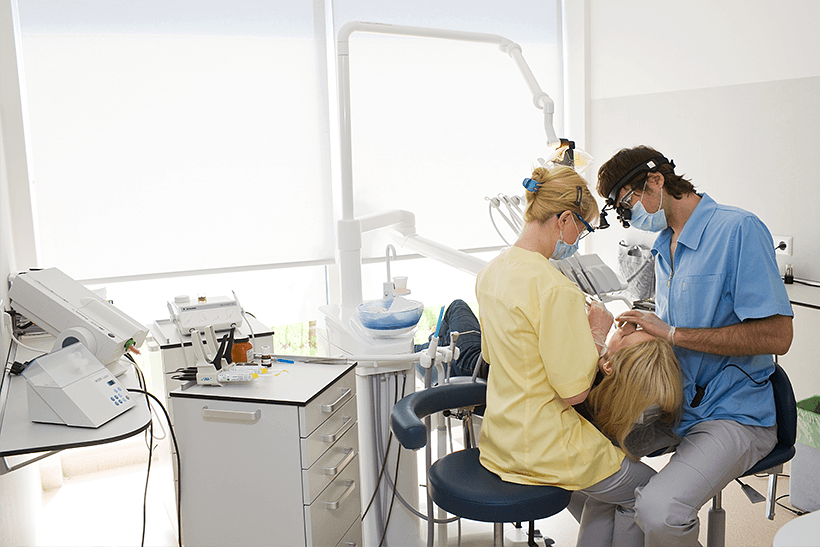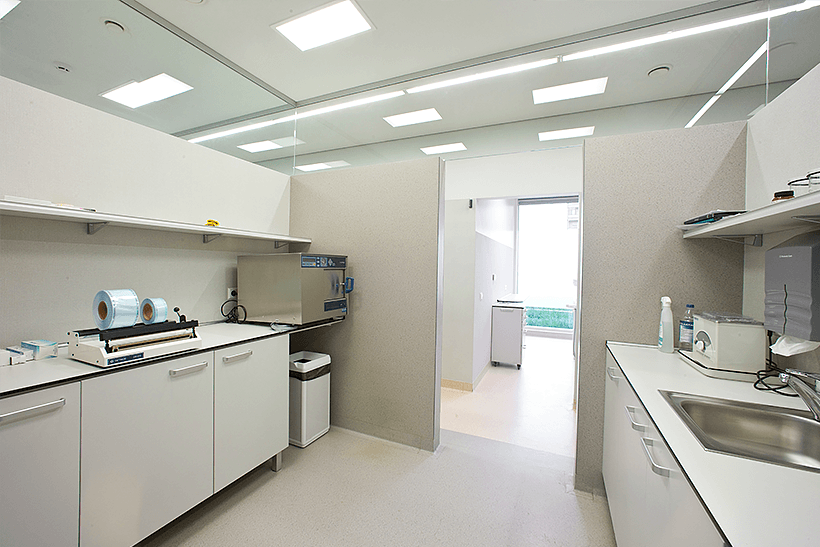About us
Experience and tradition passed on from generation to generation, ensuring and promoting the proper development and successful health of our patients: we have provided expert dental care since 1991.
Our advantages: experience, professionalism and stability in providing assistance continuously and effectively. Our doctors began and continue their careers in our clinic, focusing their efforts on the quality of their performance and the needs of our patients.
-
Operating principle #1Bene dignoscitur, bene curatur Good diagnosis - good treatment.More Less
- Already during the first patient visit, it’s critical to explain the teeth and oral health to him/her, and to carry out other tests.
- Only after evaluating the analysis (X-rays, diagnostic models, tomograms; examination, palpation results, general health), and considering several options, we develop a treatment plan and prepare a financial estimate.
- Treatment starts when the patient gives us the OK based on the information provided and agrees to the treatment plan and the financial estimate.
- Treatment methods and processes are explained in detail to the patient, making him/her a partner in the treatment, which is important because it plays a big role in the treatment’s success.
- Treatment is based on the most advanced dental technologies, in particular, reducing trauma and preserving the teeth and jaw tissues.
- he technological safety of treatments and surgeries is guaranteed by the independence of our clinic from the general power supply grid (the clinic has its own power generator in the case of power failures).
-
Operating principle #2Sedare dolorem divinum est Suppressing pain is noble.More Less
- All procedures are performed under local and general anaesthesia.
- Diagnosis, dental surgery, conservative treatments and prosthetic procedures are subjected to strict quality criteria. In addition, we use cutting-edge, increasingly-sophisticated equipment and materials.
- The dentist’s success also depends on his practical skills, intensive creative work and professional development gained over the course of many years.
- The final goal is mutual cooperation and respect between the doctor and the patient in pursuit of the best results. In particular, we highly value our patients’ trust of the clinic staff, who are always ready to provide qualified assistance.
-
 Doctor Ph.D. Antanas ČernikisDental implants and your smile
Doctor Ph.D. Antanas ČernikisDental implants and your smileWith 35 years of experience working in the field of dental implants and a dozen inventions and patents, I would like to share a few words about the evolution of this advanced technology, and its pitfalls in Lithuania. Together with Prof. S. Čepulis, Dr. O. Surovas and Dr. V.Vaitkus, I had the opportunity to develop original implants and instruments, and began my dental implant practice in Lithuania back in 1981. I defended my first dissertation on dental implants in Lithuania in 1988. I have performed several thousand implant operations and improved prosthesis on implants, and in 2007 I began lecturing on dental surgery and prosthesis implantation to dental students in the training facilities of our clinic.
Based on my inventions and consulting, the German company KOHLER Medizintechnik has begun to manufacture several types of instruments. We also provide suggestions for dental implant innovations to the Swiss company Thommen Medical.
I often analyse the results of dental implants, optimise technologies and evaluate the suitability of implants in terms of durability and quality. I now have made a conclusion that at least 10 years of high-quality implant functioning is a positive result, meanwhile, failures are mostly attributed to insufficient health testing for the patient and flawed surgery approaches. In particular, it is important to assess the anatomical parameters of jaws, changes due to age, the condition of the teeth, mucous membrane and gums, and bone structure (using X-ray). It is also important to preserve nerves and blood vessels during implantation, and to achieve initial implant stability. Before implantation, any pockets of infection in the teeth and jaws must heal. It is necessary to wait at least 4 months after a tooth extraction until the bone has formed completely. Healing of the implant (osseointegration) in the upper jaw takes 3-4 months, in the lower, 2-3 months. Unfortunately, proponents of quick implantation face the risk of complications, up to the loss of the implant. Compliance with the healing duration time (proven by long-term clinical observations) corresponds to biological processes in the bones and soft tissues, without attempting to cheat nature.
When designing a prosthetic implant, doctors should leave a clearance space between the gums and the prosthesis for hygienic cleaning.
Despite the distractions of changing trends, dentists adhering to strictly classical bio-based implant principles are more cautious and objectively achieve more favourable long-term results (20-30 years). By learning both implantation and prosthetic dentistry, a surgeon becomes superior to his colleagues specialising in a single field, because he can design a better treatment plan, select implants and prosthetic techniques, and sometimes offer a good alternative treatment. We invite more students to study oral implantology.
Based on theoretical analysis and my own clinical practice, I have chosen the implants made by the Swiss company (operating since 1980) which avoids aggressive advertising. Their advantages over other popular implants include the advanced connection between the outer ring and the head, optimising load distribution during chewing, flexibility of the thinnest anchor screw, reducing the risk of fracture, and the original system of drill guides and other prosthetic instruments.
Today, representatives of implant manufacturers are engaged in aggressive advertising in Lithuania, and implantation is becoming a widespread trend. The number of “implantation centres”, even “clusters” and “groups” is growing uncontrollably, allegedly based on innovation and EU aid, although the apparent purpose is profit maximisation and market monopolisation. The profession of mobile implanters is emerging, geared at servicing several or even several dozen dental offices, leading to the narrow approach of hasty implantation. Artisan dentists do not have a thorough understanding of rational implantation, and often are easily tempted by the promises of quick success of “implanters”. Their websites immodestly boast about their excellence, although in fact they are beginners in the field of oral implants.
Some implant manufacturers claim that their products are the only scientifically verified ones on the market.
This statement is considered to be purely promotional (and false), because most developers of implants test their products and technology from the expert and clinical point of view before patenting them.
The promotional promises made by “implanters” are questionable and often confusing:
- Beautiful “inner smile with implants”. Inner? Perhaps it’s not linked with our exterior appearance? Long ago, our ancestors (just like wild animals) intimidated their opponents by growling and showing their teeth. Now, showing one’s teeth has evolved into a smile – a gesture of friendliness and expression of a good mood. But the most important dental function is a good capacity for quality chewing, transferring the jaw forces without pain and discomfort, to crush the food. Only this healthy capacity leads to a full-fledged balanced diet, and, hence, a natural smile.
- “International lifetime warranty” – sounds like a commitment to guarantee the implant’s functioning for one’s entire lifetime (of the patient?) and compensate for damages in case of complications (Universal Lithuanian Encyclopedia, VI t., 414 p.). This promise, for unknown reasons, primarily emphasises that an “impeccable aesthetic appearance” (again, the smile) is a major purpose of life, and promises free delivery of implants and prosthetic parts to 70 countries. Philosophically, the “lifetime warranty” claims to supersede the power of God. In reality, implant failures (inflammatory effects, pain or implant rejection) usually require extra bone restoration procedures. Sometimes it’s entirely impossible to re-insert an implant. It remains unclear whether the “lifetime guarantee” covers the treatment of all complications.
- “Implantation within 1 hour, in one go, immediately after tooth extraction”. Such haste and “accelerated implantation” is certainly risky and frivolous, not only for the healing of wounds, but also for successful treatment in the long-term. As the proverb says, haste makes waste.
- “12 teeth on 4 implants”. Such a solution is possible theoretically and even practically (if the alveolar ridge is fully functional and the implants are of adequate dimensions), but the trend of pursuing records – more teeth and less implants – is not consistent with safe and positive treatment principles.
These misdeeds are detrimental to the development of dental implants, confusing to patients and non-compliant with safe treatment principles, frequently leading to many problems and complications.
-
 Doctor Jekaterina ŽukovienėHealed teeth are better than an implant
Doctor Jekaterina ŽukovienėHealed teeth are better than an implantI have been working in the field of endodontics for thirty years. In my daily practice I face both simple cases and complications (root perforation, foreign bodies in the root canal, crown and root cracks, breaks and fractures); I also deal with patients having expressed nausea reflex, limited mouth opening, anxiety and fear. I have to perform medical procedures under general anaesthesia, procedures for children and patients with mental and physical disabilities.
By treating dental root canals, we not only treat a specific tooth, but also protect the patient’s body from the spread of the tooth’s infection through the blood to vital organs (e.g. the heart muscle and valves). Delaying treatment or re-treatment of infected tooth root canals worsen the prognosis of the tooth’s life because extended inflammation makes it increasingly difficult to cure. Therefore, treatment should not be postponed due to a belief that it will lead to self-recovery.
Some dentists (especially supporters of aggressive, unjustified implantation) have a perception that it isn’t worthwhile to cure or re-treat root canals. They say it is ostensibly better to extract and implant such teeth.
Our experience has shown that with good, quality treatment of root canals and restoring the tooth crown, it can last and function for ten, twenty or more years, usually longer than a dental implant.
Today, dental technological innovations are used for root canal treatments (dental microscopes, ultrasonic instruments, bio-ceramic materials, etc.), allowing us to achieve long-lasting results.









